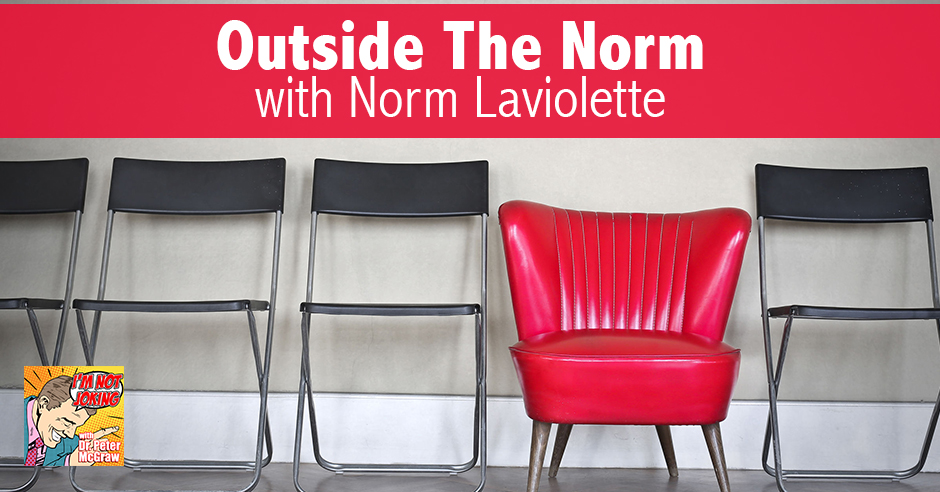Norm Laviolette is the owner of Improv Asylum and Laugh Boston.
—
Listen to Episode #30 here
Outside The Norm with Norm Laviolette
Our guest is Norm Laviolette. Norm is the owner of Improv Asylum and Laugh Boston. Welcome, Norm.
Thanks for having me.
If you did not own comedy clubs and if you were not a comedy club performer, an improv performer, standup, etc., what would you be doing with your life?
I was on track of what I was very interested in, pursuing a career in the foreign service. That’s what I wanted to do. That’s what I thought I was going to do. I went to the University of Massachusetts at Amherst. I was very much interested and intrigued by that. I have an uncle that is in the foreign service. A lot of that was driven by his experiences there and he’s stationed all around the world doing that. I knew I didn’t want to do anything normal. That was the key to it. I wasn’t smart enough or talented enough. I’m underselling that. I wasn’t mature enough to learn how to be talented enough to do more important things. That’s based on, to a degree, personality and I always had that. I was like, “I can work this into the foreign service in some way, shape or form.”
What the hell is a foreign service?
Typically, it’s a diplomatic corps, things of that nature. There can be elements of CIA and stuff like that, but it wasn’t even that because you have to go through the military on that. For me, it was like the diplomatic corps and what’s out there. In particular, I was interested in the security end of the diplomatic corps.
I love the idea of thinking about you doing diplomacy. For the audience, it’s probably important to know that I know Norm from a cold email. Norm heard about the Humor Code and sent me an email. I get a decent number of very nice messages from folks and what I end up doing is some Googling to see what they’re up. I was like, “This guy seems legit.”
That’s the beauty of things nowadays. Everybody checks everybody’s credit. It’s like, “Who’s this maniac? It seems like they’ve got some credits. I’ll email them back.”
In the spirit of improv, you wanted to talk about this stuff. Part of it is the appeal of the Humor Code and our foreign travels. I had been planning a Humor Hackathon at Boulder Startup Week and I was like, “Norm, if you want to come out, I need a judge. I can’t pay you but it’s going to be a fun week. It will be a good time.” All the hotels were all booked up and stuff like that.
You were making it sound super appealing, “I can’t pay you. There are no hotels.”
I was like, “You can crash in my place if you want.” You were like, “Sure.” It was great. We had a good time and the Hackathon was good. We did a hackathon at this content marketing event.
[bctt tweet=”Go out and experience more. Good, bad, or indifferent, you’re going to get a story out of it.” username=””]
It was great. I had never participated in anything like that and so for me, it was fun to go out there. It’s also the embodiment of how you’re trained as an improvisational actor. The concept of “Yes, and,” which is yes, taking in the idea and being willing to go somewhere. It’s all well and good when you talk about it in theory. Theory is bullshit. How do you put it into practice? To me, that was an opportunity of I wanted to learn and experience more. I have the yes from you. I had to put the and on and get my ass on a plane and go see what this is going to be about. Good, bad or indifferent, you’re going to get a story out of it. If it’s a good experience, then we create a relationship. If it’s a bad experience, I get a story. Either way, I’m like, “I’ll go.”
It’s funny what a small world it is because I gave a talk at your club. We’re in Laugh Boston at a conference that you were emceeing and giving a talk. The world of comedy can become quite small.
I would say not only the world of comedy but the world if you’re willing to embrace some things and say yes and go out there. I’m one of those weird thinkers where I’m like, “There’s no such thing as a coincidence.” I say that for a fact to a degree but on the other hand, I do believe it because it’s like luck. Everyone wants to say like, “You’re so lucky,” and that can chafe somebody like me quite a bit. I’m not lucky. I’m fortunate, don’t get me wrong. There’s a big difference. You’ve got to get in front of your luck. That’s how coincidence happen. You’re not going to get lucky unless you get out in front. I always say luck is like a train, you’re not going to get hit by a train unless you get in front of that damn train. Odds are it’s not going to wildly go off the tracks and run you over. To me, when something like that or these coincidences happen, it doesn’t surprise me at all because we connected. We put it into motion and we each took a chance to establish relationships. The world is small enough where it tends to bring it back around, in my experience.
I want to talk to you about this idea of what the world can learn from comedy. I’ve been noodling on this idea and I gave a talk related to it. “Yes, and” is critical for living an interesting life and that’s my goal more than anything else.
Same with me. When you said the idea that it’s funny to imagine me as a diplomat, it’s an interesting life. If you think about it, that’s still what I’m pursuing but I’m pursuing that after comedy.
I don’t want to say the, “Yes, and” is tired but it’s well-known.
It’s tired, it’s trite. I’m not saying it’s not valid and true, but it is.
People know it. A lot of people talk about it. It’s in books. It’s there.
It jumps the shark. I give presentations and I talk about it and use it as well. I remember when somebody beat me to it, somebody like some crappy insurance company and they’re like, “Yes, and.” I’m like, “I’ve got to change this shtick up.” I get it, it’s tired in the sense that it’s in the vernacular.

You live in a world of comedy, but you’re also a businessman. If you were to break down your life, what percentage of your life is business and what percentage of your life is a comedy?
Now within my career, it’s far more the business of comedy. It’s creating these clubs and these opportunities for other people to run them because I don’t do a damn thing. I’m surrounded by people that do what they do well. What I do in both the business and the comedy is innovate. While it is mostly business, I feel like it’s intersected very much. For me, I still create. I create now on a different level. I’m not creating nightly on stage. That’s not my life, that’s not my job yet I still use those same skills to say to myself, “What’s that next thing? Where’s the pattern recognition? Where can we go? What can I do?” Asking those questions and then the skillset that I have is, for whatever reasons, I have the ability to jump on an idea when I like it. That’s what I do. If I have an idea, I jump on it, I like it, I tend to ride it out and see where it goes.
What’s an example of that?
I get fascinated by things and it’s not just comedy. I get obsessive about stuff. I’ve got something hooked in my brain. At Improv Asylum or at Laugh Boston, any comedy club or whatever, there are items in the lost and found. I’m not kidding you. This is going to get me out of this very tough trade, which is the comedy business. Historically, we would do this thing where I was directing more shows like that. Every now and then, we’d have the cast and we’d go lost and found shopping. You would go to lost and found and you grab the stuff. It’s predominantly scarves and gloves here in Boston and sunglasses and umbrellas. You’re umbrella rich. Sometimes you’re like, “That’s a pretty nice thing.” I got hooked in my mind and I kept thinking about this. If Improv Asylum has all this stuff every month and that Boston has this stuff, then what do we do with it? The staff goes through it, take what they want and you throw the rest out.
I got hooked in my mind. I was like, “If we have all this stuff, every restaurant in the north end of Boston, that’s where the club is, has this stuff and they do the same thing.” I always thought like, “Let’s test it.” I knew all the restaurants, so I would go to the restaurant and I was like, “John, what do you do with your lost and found stuff? I know you take it, the staff takes it but once that’s done, what do you do with it?” Immediately he was like, “We throw it out.” I was like, “Would you give it to me?” He was like, “Absolutely.” Every restaurant and every club has it. Every restaurant and club would give this to me. If every restaurant and club in Boston will give it to me, every restaurant, bar and club in the United States will give it to me. If every restaurant and bar and club has it, so does every sports venue. Then I went out to the sports venues that I knew and I was like, “Would you give me your stuff?” They were like, “You will take all of our shit from our Minor League baseball stadium? Absolutely.”
You iterate off one more time and then you go to yourself, “Would the hotel give it to me?” Laugh Boston’s in a hotel. You go out to the hotel and say, “Would you give me your lost and found stuff?” I know you take it, but after that they were like, “Yes, we’ll give you this stuff.” You’re not throwing it away. I iterated all the way up with the idea. I went all the way to an unnamed professional sports team and they were like, “We could work something out.” That’s free sourced material that you could create. Even if 90% of it was crap, 10% of it is good and 10% of it could then be used. You’re repurposing it and creating its own store. People leave beautiful North Face jackets and stuff like that. It’s this whole concept that I’m working on and I follow it. I know how this ends. This ends with a giant warehouse full of shit that I can’t do anything with. I accept it but that’s a thing where I create and follow the thread and I enjoy it so much.
[bctt tweet=”Luck is like a train. You’re not going to get hit by a train unless you get in front of that train.” username=””]
What you described is not unlike a comedian working on a bit obsessively. It’s the same thing. How do you see your comedy life and your business professional life? Clearly, to be able to focus and to think on something that no one else is thinking about, although once you pointed it out, it feels obvious. Where are the other things that you’re mining your comedy background to help you as a professional?
Appropriate risk-taking. That becomes huge. You can’t do comedy without taking risks. Just the fact that you would either sign up for an improv class or step on stage for an open mic, that is a risk. You can’t do it without risk.
When you say appropriate risk-taking, tell me about that.
Appropriate risk-taking is if you’re going to do comedy, you’re probably going to find an open mic or an improv class. There’s a risk that you’re doing the comedy. It’s appropriate because you’re stepping up on the open mic stage that allows it. It may be less appropriate if you showed up at the nursing home. It may be way better and maybe more appreciated at the nursing home but that’s the appropriateness. Everybody thinks that being an entrepreneur or even a performer is all about wild risk-taking. It’s not so much about wild risk-taking, it’s about identifying what you think is a risk worth jumping at. That’s what I call appropriate risk. You’ve got to take risks. Everybody thinks they’re wild swings. They’re not wild swings.
A lot of smart folks in the world, of startups and so on, everybody celebrates failing and failing fast. There are a lot of people who push back on that idea and what they talk about is, “No, you want to limit your downside risk.” You want small failures with big upside. Taking an improv class fits that. The upside of taking an improv class is huge. It can change your life. The downside of it is very minor. It’s a bit uncomfortable and you have some bad days, but you have plenty of good days as a result of that.
It’s the same within the business of comedy. You start to assess, you use that same skill. As I assess the growth of our companies and our brands, I look at things. I look at things and I assess the opportunity and each one comes with a risk.
It’s risk of a warehouse full of crap. It’s not a huge risk though.

If you think about it, it isn’t because I acquired all that stuff for free. I’ll give you a real-world example within the company industry and I’ll give you a scoop. We have Improv Asylum in Boston. I became aware of an opportunity to bring Improv Asylum to a new market. It came to be that there was a theater that presented itself as being open in New York City. That’s a big move for any company. I was made aware that this theater was available. Using my instincts, I was like, “The next step is to go see it.” I immediately went down to check it out. This theater is right in New York City. It was a thriving improvisational comedy theater, which is already that’s my business. That’s what I do and it was available. I was like, “We’ve got to try to explore this.”
We jumped in and we got into negotiations with the landlord and stuff like that. I said, “We’re doing it.” As I looked at everything from the location, the opportunity, the finances, the rent, there are a lot of risks. It doesn’t mean it’s going to work but in the grand scheme of what I know economically on how these places are run, there’s a real good chance that this will be a go. Not only do I think it’s a good chance that it will be a go, the upside to being in New York and all of the other elements of my business, the corporate training and the speaking stuff like that, that comes out of the storefront. I was like, “That’s a swing I’ve got to take.” We did it and I’m signing a lease on the New York City Theater. We will be opening Improv Asylum in New York City.
[bctt tweet=”Life’s too short to work with assholes.” username=””]
We’re both in suits now. We both look good. You were talking about how when you perform, you will often dress up. One thing that I noticed about you and liked about you is although you have this fun, feisty side, you have this very professional side to you. We started talking about how the best comedians are actually the most professional. They may seem like the least professional people on stage, the way they dress, the way they behave, but they’re the most professional behind the scenes. Can you give me a little bit of insight as someone who works with comedians the best and worst in that way?
It’s a job. If you want to do this as a job, it is a job and you have to treat it as such. At Improv Asylum for example, when our actors go on stage, what we call our main stage cast, that’s the main cast that we’re trying to get into, they all wear suits. The reason for that is it tells your audience that we take this stuff very seriously. We jump around, we make ourselves look stupid and stuff like that. The point is that we show you that we take what we’re about to do for you very seriously and we want you to take it seriously as well. It’s a job. Psychologically, it tells the audience and they’re like, “They must be pretty good, they’re in suits.” It’s a simple psychological play. It changes the expectation. You can have those same people and do the same thing in matching t-shirts, but there’s a judgment that’s going to be made on that like, “This is corny, this is hokey.” Contrast that with you have our main stage show. We’re in our suits and we do that 7:30 PM and 10:00 PM on a Saturday.
At midnight, we do a show called Raunch. The idea of that show is that we will take all those nasty, awful suggestions that are yelled at us throughout the night that we typically wouldn’t take because we want to keep showing. I’m like, “You want to be nasty, you don’t know what nasty is.” In that show, we even say it as we set up the show to the audience. You can stay for free if you went to 10:00 PM or 7:30 PM. We say, “At midnight we go back, we take our suits off, we drink and we take your nasty shows.” We show you this transformation into professionals into what we’re doing. It psychologically tells you that whatever it is you’re doing, we take it seriously. You give us more respect out of it.
What about behind the scenes? Your most successful comedians, the folks who treat it like a job? What are they doing interacting with you and your staff? Not when they’re on stage, but when they’re just coming and going and doing. Is there anything that stands out or a story that comes to mind?

Change that over to Laugh Boston because now that’s a different animal. We don’t control the labor as it were there. You have all the independent contractors which are the stand-up comedians coming in. By and large, the ones who are successful are the ones who show up when they’re supposed to show up, who are treating the staff and everybody professionally and appropriately, who come in when supposed to be and where they’re supposed to be there. It’s their job. They’re showing up. The people that we don’t book back. We use the asshole rule, “Life’s too short to work with assholes.”
There are a lot of funny people to choose from.
[bctt tweet=”How much pain can you accept in pursuit of your goal and not quitting?” username=””]
There always will be. It doesn’t just stop next year. It’s always coming up. It’s the people who treat it like a job and treat the people around them like you would any other co-worker.
The last question, the secret to success that everybody knows, but can’t seem to do. What is it?
We’re all biased to our own experiences, life experiences, stuff like that. For me, it’s been the idea of pain tolerance, which is how much pain can you accept in pursuit of your goal and not quitting? It’s very easy to say never give up, but it’s not that.
That’s bad advice too. Sometimes it’s smart to give up.
You should quit. If you don’t get cast in something like in Improv Asylum or if you don’t get to show that you want, if you quit, good. That means that you shouldn’t be doing this and you’ll probably be happier doing something else. It clears the way for those that should be doing this. I go back to it’s your pain tolerance. If you can fight through the psychological, sometimes physical, the pain that you have to push through, that can be like, “I’m not going to spend as much time with my kids at this point.” If you can get through the pain tolerance and push through that because you will get through it and oddly enough, that weird thing that feels painful starts to feel pleasurable. When you can push through the pain element of it, when it starts to oddly enough feel pleasurable, that in my mind is worth doing. There is where you find the success. You want to do this. What’s your pain tolerance?
I was having a conversation with a comedian where I was questioned why am I doing what I’m doing? That’s a normal thing at times. One of the things I said was, “I’d like to write every day.” Ten years ago, when I started writing every day, I would not have said that. Five years ago, maybe I would have said that, but I certainly say it now. I’m not even sure what I want to write, if it’s worth writing but I know that I want to do the writing. The pain has become a pleasure and now I’m trying to find which way do I guide it to an outcome that’s going to be beneficial to me and hopefully to others.
It’s pushing through that and then it does become pleasurable. People ask me all the time like, “What do you think of these crazy different ideas? Aren’t you happy of them?” It causes me pain because I’m like, “I think this might be a good idea.” I do respond to it like, “I don’t need another one. I don’t need this aggravation in my life.” I’m like, “Set up the meeting with the fairy company. I want all the fairies lost.” I’ve done that. It is painful to a degree, but it’s also very pleasurable.
What you’re describing is that you’re focused on process and then good outcomes happen. They’re not guaranteed to happen, but you have to enjoy the process of thinking about it. Norm, thank you so much.
Thank you so much. Thanks for having us.
Cheers.
Resources mentioned:
- Improv Asylum
- Laugh Boston
- Boulder Startup Week
- https://Twitter.com/normlaviolette?lang=en
- https://www.ImprovAsylum.com/our-story/
- https://www.LinkedIn.com/in/norm-laviolette-15a4077
About Norm Laviolette

